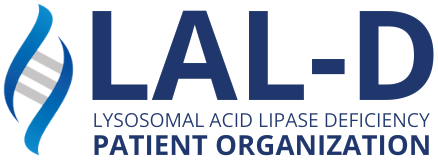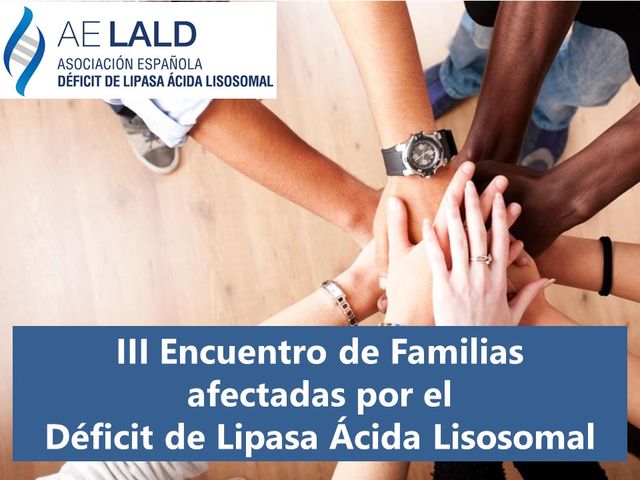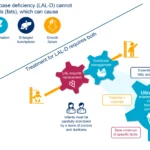This disease, considered ultra-rare and affecting 42 people in Spain, is also known as Wolman’s disease and Cholesterol Ester Storage Disease.
Lysosomal Acid Lipase Deficiency (LAL-D) is an autosomal recessive storage disease based on the accumulation of cholesterol esters and triglycerides in the cellular lysosome. This disease is characterized by multiorgan involvement, including the liver, spleen, cardiovascular system, and, to a certain extent, the gastrointestinal system. LAL-D can be differentiated into two phenotypes. One is Wolman’s disease, which affects infants and is fatal; death usually occurs within the first 12 months of life. Cholesterol Ester Storage Disease, the other phenotypic expression, manifests less rapidly and affects both children and young adults. Unfortunately, once symptoms develop, a significant percentage of patients may experience progression from liver fibrosis to cirrhosis or the need for a liver transplant within 3 years of symptom onset.
The frequency of the disease is still not fully known. Studies have reported various prevalence estimates, ranging from 1 in 130,000 to 1 in 300,000.
The Spanish Association for Lysosomal Acid Lipase Deficiency (AELALD) was founded in January 2015 by the parents of a 3-year-old girl diagnosed with this disease. The association’s purpose is to care for, unite, and provide guidance to affected individuals and their families, to promote widespread awareness in the diagnosis of new patients, and to promote research into the disease.
As the only specific Association for this disease in Europe, the III Meeting of Affected Families was held last Saturday, November 9, 2019 in Madrid (at the ONCE Foundation), with the participation of specialists in the disease such as Dr. Maria Mercadal from the Pediatric Hepatology and Liver Transplant Unit at Vall d’Hebron, who gave a presentation on the Development, evolution and treatment of the disease and advances in research; Dr. Pilar Giraldo from the Translational Research Unit (UIT) of the Aragón Health Research Institute, who spoke about New perspectives in the diagnosis and monitoring of lysosomal diseases. More information was provided by Dr. Laura López de Frutos from the Translational Research Unit (UIT) of the Aragón Health Research Institute, with a presentation entitled Update on research projects in LALD. Additionally, Dr. María Luisa Martínez Triguero, Head of the Clinical Analysis Service at La Fe University and Polytechnic Hospital in Valencia, presented her interesting project, Searching for Patients with LAL Deficiency from the Clinical Analysis Laboratory.
Dr. Emili Ros, a lipidologist and researcher at the Hospital Clínic de Barcelona, IDIBAPS, and CIBEROBN, gave a presentation on Healthy Diet: Recommendations for People with LAL Deficiency and Their Families.
We also received information on Psychosocial Care for Rare Diseases from Andrea Falip, a social worker at ASEM Catalunya. Finally, we had the opportunity to hear the presentation Acceptance as a Path by Eduardo Brignani, a psychologist and psychotherapist specializing in Disability, Family, and Rare Diseases.




